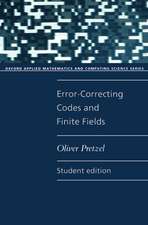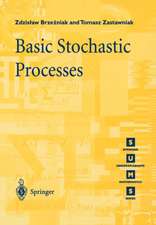Management of Knowledge Imperfection in Building Intelligent Systems: Studies in Fuzziness and Soft Computing, cartea 227
Autor Eugene Roventa, Tiberiu Spircuen Limba Engleză Hardback – 14 oct 2008
| Toate formatele și edițiile | Preț | Express |
|---|---|---|
| Paperback (1) | 558.52 lei 38-44 zile | |
| Springer Berlin, Heidelberg – 17 noi 2010 | 558.52 lei 38-44 zile | |
| Hardback (1) | 644.18 lei 6-8 săpt. | |
| Springer Berlin, Heidelberg – 14 oct 2008 | 644.18 lei 6-8 săpt. |
Din seria Studies in Fuzziness and Soft Computing
- 20%
 Preț: 999.85 lei
Preț: 999.85 lei - 20%
 Preț: 653.06 lei
Preț: 653.06 lei - 20%
 Preț: 872.98 lei
Preț: 872.98 lei - 20%
 Preț: 930.57 lei
Preț: 930.57 lei - 20%
 Preț: 1051.00 lei
Preț: 1051.00 lei - 20%
 Preț: 992.44 lei
Preț: 992.44 lei - 20%
 Preț: 655.85 lei
Preț: 655.85 lei - 20%
 Preț: 1001.86 lei
Preț: 1001.86 lei - 18%
 Preț: 954.14 lei
Preț: 954.14 lei - 20%
 Preț: 330.10 lei
Preț: 330.10 lei - 20%
 Preț: 333.04 lei
Preț: 333.04 lei - 20%
 Preț: 997.56 lei
Preț: 997.56 lei -
 Preț: 391.61 lei
Preț: 391.61 lei - 20%
 Preț: 647.79 lei
Preț: 647.79 lei - 20%
 Preț: 986.01 lei
Preț: 986.01 lei - 18%
 Preț: 958.56 lei
Preț: 958.56 lei - 20%
 Preț: 996.40 lei
Preț: 996.40 lei - 20%
 Preț: 999.35 lei
Preț: 999.35 lei - 15%
 Preț: 646.43 lei
Preț: 646.43 lei - 20%
 Preț: 651.57 lei
Preț: 651.57 lei - 20%
 Preț: 997.89 lei
Preț: 997.89 lei - 15%
 Preț: 641.03 lei
Preț: 641.03 lei - 20%
 Preț: 1009.74 lei
Preț: 1009.74 lei - 20%
 Preț: 992.62 lei
Preț: 992.62 lei -
 Preț: 388.72 lei
Preț: 388.72 lei - 18%
 Preț: 1223.43 lei
Preț: 1223.43 lei - 20%
 Preț: 651.42 lei
Preț: 651.42 lei - 18%
 Preț: 951.59 lei
Preț: 951.59 lei - 18%
 Preț: 948.61 lei
Preț: 948.61 lei
Preț: 644.18 lei
Preț vechi: 757.85 lei
-15% Nou
Puncte Express: 966
Preț estimativ în valută:
123.27€ • 129.62$ • 101.85£
123.27€ • 129.62$ • 101.85£
Carte tipărită la comandă
Livrare economică 16-30 aprilie
Preluare comenzi: 021 569.72.76
Specificații
ISBN-13: 9783540774624
ISBN-10: 3540774629
Pagini: 268
Ilustrații: XIV, 254 p. 81 illus.
Dimensiuni: 155 x 235 x 21 mm
Greutate: 0.52 kg
Ediția:2009
Editura: Springer Berlin, Heidelberg
Colecția Springer
Seria Studies in Fuzziness and Soft Computing
Locul publicării:Berlin, Heidelberg, Germany
ISBN-10: 3540774629
Pagini: 268
Ilustrații: XIV, 254 p. 81 illus.
Dimensiuni: 155 x 235 x 21 mm
Greutate: 0.52 kg
Ediția:2009
Editura: Springer Berlin, Heidelberg
Colecția Springer
Seria Studies in Fuzziness and Soft Computing
Locul publicării:Berlin, Heidelberg, Germany
Public țintă
ResearchCuprins
“Classical” Expert Systems.- Knowledge Representation.- Uncertainty and Classical Theory of Probability.- Statistical Inference.- Bayesian (Belief) Networks.- Certainty Factors Theory.- Belief Theory.- Possibility Theory.- Approximate Reasoning.- Review.
Textul de pe ultima copertă
There are many good AI books. Usually they consecrate at most one or two chapters to the imprecision knowledge processing. This book is among the few books to be entirely dedicated to the treatment of knowledge imperfection when building intelligent systems. We consider that an entire book should be focused on this important aspect of knowledge processing. The expected audience for this book includes undergraduate students in computer science, IT&C, mathematics, business, medicine, etc., graduates, specialists and researchers in these fields. The subjects treated in the book include expert systems, knowledge representa-tion, reasoning under knowledge Imperfection (Probability Theory, Possibility Theory, Belief Theory, and Approximate Reasoning). Most of the examples discussed in details throughout the book are from the medical domain. Each chapter ends with a set of carefully pedagogically chosen exercises, which complete solution provided. Their understanding will trigger the comprehension of the theoretical notions, concepts and results.
Features of the book:
a) Comprehensive comparative approach to deal with most of the techniques of management of knowledge imperfection
b) Breakthrough fuzzy techniques approach for handling real word imprecision
c) Numerous examples throughout the book in the medical domain
d) Each chapter is followed by a set of detailed solved exercises.
Features of the book:
a) Comprehensive comparative approach to deal with most of the techniques of management of knowledge imperfection
b) Breakthrough fuzzy techniques approach for handling real word imprecision
c) Numerous examples throughout the book in the medical domain
d) Each chapter is followed by a set of detailed solved exercises.
Caracteristici
First book treating the knowledge imperfection in building intelligent systems Includes a lot of examples and Visual Prolog programs















